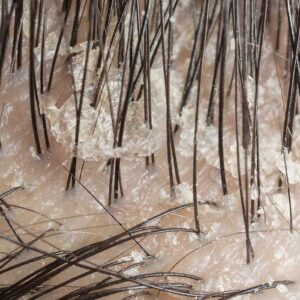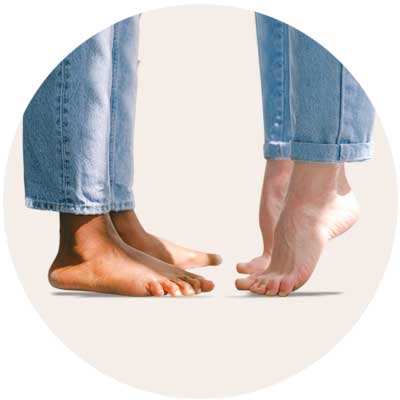
What is Dandruff?
Dandruff (pityriasis capitis or, pityriasis capillorum) is one of the most common conditions affecting the scalp. The skin sheds cells constantly, but this process is usually invisible because the individual plaques of skin from the stratum corneum are far too small to be seen. Dandruff, however, refers to those plaques which shed from the scalp in visible silver-white flakes. Dandruff usually appears alongside the inflammation of the scalp, which irritates the skin and causes the urge to itch. Itching the scalp, however, dries out the skin which only accelerates the rate at which the dry, dead scales detach and fall. Dandruff is not contagious, but it can cause great psychological discomfort to individuals as they can become self-conscious of visible flakes in their hair and on their clothing. Dandruff can also cause considerable physical discomfort as it can be extremely itchy.
What are the symptoms of dandruff?
Dandruff causes the intensive flaking of skin on the scalp. Dandruff causes both small and large scales to fall. The former, or dry dandruff, causes flour-like flaking and mainly affects those with dry scalps and hair. Dandruff with large lamellae, or oily dandruff, causes flakes that appear like grated cheese. It usually affects those with a greasy scalp or those who suffer from seborrheic dermatitis or psoriasis.
What are the causes of Dandruff?
There are several causes of dandruff, some of which may coincide with one another:
- Presence of the Malassezia furfur (or pityrosporum) fungus, that feeds on the oily, waxy substance (sebum) on the scalp. Malassezia is an irritant that triggers dandruff flakes to fall.
- Stress. Sometimes stress is linked to seasonal changes, a time in which dandruff problems are often more prevalent. Stress alone can trigger dandruff or make it more difficult to treat.
- Having dry or oily skin. Dry environments can irritate the skin, provoking dandruff, while it can also be a symptom of conditions such as seborrheic dermatitis.
- Psoriasis can accentuate the appearance of dandruff.
- Shampoos and other cosmetics can cause irritation and, in some cases, irritative contact dermatitis which can trigger dandruff.


What to do in case of dandruff?
As an alternative to harsh shampoos which can aggravate symptoms, use the gentle, non-foaming Dermicitol Shampoo which cleanses the hair and scalp during dermatitis flares. Dermicitol Shampoo contains natural anti-inflammatory ichthyol sulfonate compounds which help soothe redness.
For best results:
- Wet hair
- Pour Dermictiol Shampoo into hands and massage into the hair only, without rubbing the shampoo into the scalp (for example, wash the hair with the head upside down).
- Rinse, and if necessary, repeat
- Dry the hair with cotton terry cloth
If scales appear on the scalp, apply 2S Cream twice a day: once in the morning before following the Dermictiol Shampoo routine (above), and again in the evening. The scales will come off automatically during washing.
In cases of persistent dandruff, rub 7-10 drops of Glicosal Lotion into the scalp every evening. This lotion has a gentle exfoliating action.
The following steps can help prevent dandruff occurring:
- Use Dermictiol Shampoo
- Apply Glicosal Lotion two evenings a week. Apply 10-15 drops of lotion across the scalp and lightly massage until absorbed
- Sun exposure: UV rays can help reduce Dandruff. However, as prolonged sun exposure damages skin, avoid sunbathing and always wear sunscreen on your face and body when outside.
Avoid situations of prolonged mental and physical stress.
Avoid hair washing with highly foaming shampoos.
Avoid massaging shampoo into the scalp during washing.













